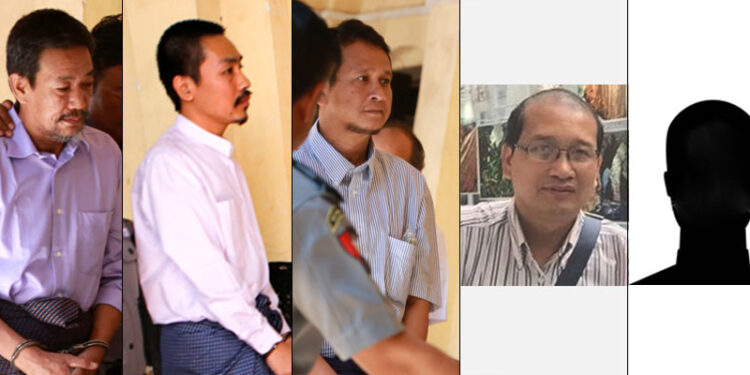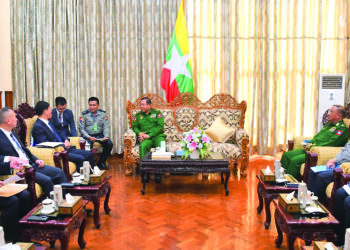Assassins and schemers behind the killing of prominent lawyer U Ko Ni are still at large one-and-a-half months after the crime was committed.
Will they be apprehended soon? That’s what we are all waiting for.
On Friday, four suspects appeared in court in Rangoon for the first time: ex-lieutenant Aung Win Zaw—brother of Aung Win Khaing—ex-captain Zeya Phyo, gunman Kyi Lin, and a new suspect in the case: Aung Win Tun.
Ex-lieutenant colonel Aung Win Khaing, an alleged key perpetrator in the plot to kill the National League for Democracy legal adviser, is still at large after he curiously disappeared in Burma’s capital Naypyidaw.
The public suspects that in this high-profile murder, there are bigger fish at large than Aung Win Khaing. There is considerable disquiet that the Home Affairs Ministry, which is responsible for the case, has yet to bring a key culprit to court and disclose the true picture of the case.
At a ceremony in Rangoon on Saturday to mark 40 days since U Ko Ni was shot dead at Yangon International Airport on Jan. 29, patron of the ruling NLD party U Tin Oo said he was surprised that important suspects were yet to be arrested. He urged the authorities to apprehend them as soon as possible.
Like him, the public is impatiently waiting for the truth, while the victim’s family is waiting for justice. There are almost endless unanswered questions surrounding the case:
Why did Aung Win Khaing flee to Naypyidaw, the city with the most surveillance in Burma, instead of a distant hideout like other criminals?
What is behind the fact that all key suspects are ex-military officials?
Are any other high-profile individuals or organizations involved in the case?
How could the alleged assassins afford to spend nearly US$100,000 on the assassination?
Why is it taking so long for the police to apprehend Aung Win Khaing?
All are valid questions and people are trying hard to connect the dots.
Many people are convinced that U Ko Ni was targeted because of his strong criticism of the military-drafted 2008 Constitution and had consistently advocated for the amendment of the undemocratic charter.
Among the many questions, the biggest for a lot of people is why all key plotters in the case are ex-military officials.
A former military colonel named Lin Zaw Htun, currently a lawmaker for the Union Solidarity and Development Party (USDP), was questioned by police over his friendship with two of the suspects, ex-army men Aung Win Khaing and Zeya Phyo.
Some members of the general public worry that current influential elements in the institution, or associates linked to it, are involved in the case.
This theory is only set to keep growing as long as the police and the Ministry of Home Affairs fail to thoroughly explain the case and bring the culprits to justice.
No one has dared to publicly give voice to this suspicion yet. Meanwhile, the military has denied the theory before it came to light in public.
The armed forces’ chief of general staff Gen Mya Tun Oo said in a press conference on Feb. 28 that the military, known as the Tatmadaw, was not responsible when asked if he knew of any organizations behind the assassination.
His answer indicated that top military officials have the impression that people suspect that the Tatmadaw—or high-ranking officials in the establishment—might be involved in the murder, perhaps due to the involvement of ex-military persons.
Gen Mya Tun Oo rejected accusations around Lin Zaw Htun that implicated the Tatmadaw: “Even if he [Lin Zaw Htun] is involved, it has nothing to do with the Tatmadaw. He has resigned from the army. The Tatmadaw is not involved, even if he is found of guilty.”
But suspicion remains over Lin Zaw Htun’s close friendship with the two key suspects Aung Win Khaing and Zeya Phyo.
Significantly, it has been reported that Lin Zaw Htun served as personal security officer for the commander-in-chief of the military, Snr-Gen Min Aung Hlaing. Lin Zaw Htun retired from the army in 2015 to run for office under the USDP.
The positions on the case of the military-controlled Home Affairs Ministry and the military itself differ from the ruling NLD party and its leader Daw Aung San Suu Kyi, Burma’s State Counselor.
Daw Aung San Suu Kyi attended the ceremony in Rangoon last month to mark one month since the incident and described U Ko Ni and driver U Nay Win, who died trying to apprehend the gunman Kyi Lin, as martyrs.
At the Feb. 28 press conference a day before, Minister of Home Affairs Lt-Gen Kyaw Swe downplayed the significance of the suspects as ex-military officials and said that the assassins were motivated by “extreme nationalism” and “personal grudges.”
His responses became the subject of ridicule in day-to-day conversations and on social media—which the military leaders must have noticed.
The ex-military officials’ involvement in the murder has definitely done nothing to improve the image of a military already accused of human rights abuses in Kachin, Shan, and Arakan states.
There is only one way for the military and home affairs ministry to control this damage—to seriously try to bring all key suspects into court as soon as possible. Otherwise, conspiracy theories will continue to spread and grow.
This important murder case should not simply disappear in the same way Aung Win Khaing slipped away in Naypyidaw.

















